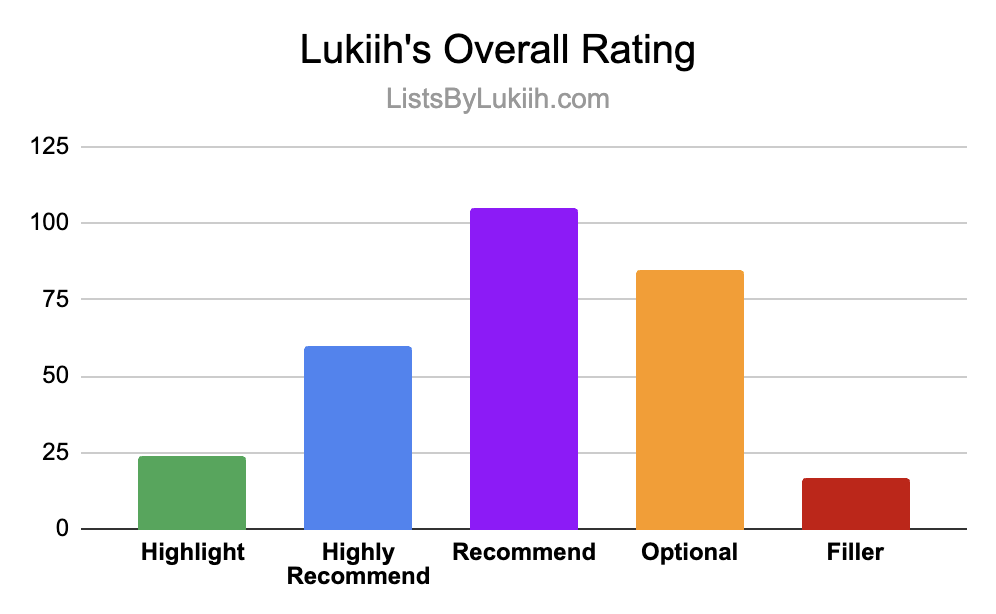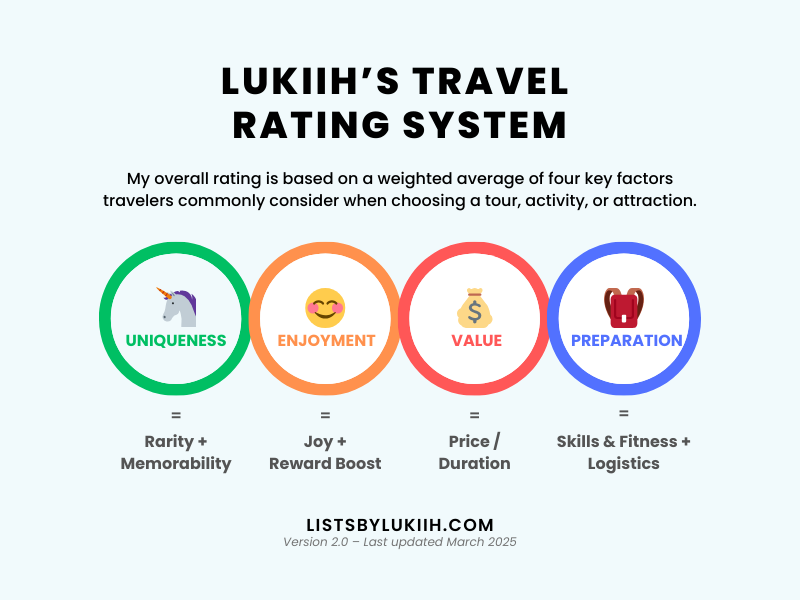Travel guides list countless “top things to do,” but it’s not always clear which experiences are actually worthwhile. That’s why I created a practical rating system that scores activities across key factors and accounts for real-world constraints.
It allows me to compare everything—from street food tours in Bangkok to multi-day hikes in Patagonia—and provide a prioritized, consistent set of recommendations. Below is a breakdown of how my system works and the assumptions behind it.
🍀 Understanding Lukiih’s Overall Rating
My overall rating uses a 10-point scale to show how strongly I recommend an experience to other travelers.
Here’s the distribution of my overall ratings, based on the first ~300 travel experiences I’ve reviewed (last updated March 2025).

The Four Factors Behind the Rating
My overall rating is based on a weighted average of four key factors travelers often consider when choosing a tour, attraction, or activity.
Calculating Overall Rating
Each of the four factors is scored numerically, then translated into a more intuitive label (e.g., very high, high, average, low, very low). Each factor is weighted based on how much it influences the final rating. Uniqueness and Enjoyment carry more weight than Value and Preparation.
🍀 Overall Rating = (🦄 Uniqueness Score * Large Weight) + (😊 Enjoyment Score * Largest Weight) + (💰 Value Score * Smaller Weight) + (🎒 Preparation Score * Smallest Weight) 🦄 Understanding Factor #1: Uniqueness
The Uniqueness Score is based on two questions:
- How rare is the experience?
- How memorable is the experience?
Uniqueness gives equal weight to Rarity and Memorability. Rarity is a strong motivator to do an experience, while memorability approximates whether it is as unique as it is rare.
🦄 Uniqueness Score = (Rarity Score * Equal Weight) + (Memorability Score * Equal Weight)Scoring Rarity
To evaluate rarity, I consider:
- How many similar experiences exist worldwide?
- Can it be authentically replicated elsewhere?
- Is it considered the “best” in any meaningful way?
Scoring Memorability
To evaluate memorability, I ask:
- Is it easily recalled later?
- Does it leave a strong impression?
😊 Understanding Factor #2: Enjoyment
The Enjoyment Score is based on two questions:
- How much joy does the experience bring? Think delight, bliss, or thrill.
- How rewarding is it? This reflects feelings of accomplishment or personal growth.
Enjoyment is based on the Joy Score, with a boost from how rewarding the experience is. Joy is usually the main driver of whether something feels recommendable. Reward adds depth, but its absence doesn’t necessarily take away from the experience.
😊 Enjoyment Score = (Joy Score) + Function(Reward Score)Scoring Joy
To evaluate joy, I ask:
- How much joy does the experience bring? Think delight, bliss, or thrill.
- Do inconveniences (like crowds, long waits, or weather risks) regularly occur—and do they noticeably affect the experience?
Scoring Reward
To evaluate how rewarding an experience is, I ask:
- Are feelings of accomplishment typical? Was it physically or mentally challenging?
- Are feelings of enrichment typical? Did it leave an emotional impact or sense of connection?
💰 Understanding Factor #3: Value
The Value Score is based on two things:
- What’s the typical cost per person?
- How much time does the experience usually take?
🎒 Understanding Factor #4: Preparation
The Preparation Score is based on three things:
- How much skill or fitness does it require?
- How inconvenient is the transportation?
- How much effort is needed to pack, book, or prepare?
A higher Preparation Score means the experience is easier or more convenient. Less preparation usually makes something more accessible and easier to recommend.
🎒 Preparation Score = (Skills & Fitness Score * Largest Weight) + (Transportation Score * Large Weight) + (Booking & Packing Score * Small Weight)Scoring Skill & Fitness
To evaluate how much skill or fitness an experience requires, I ask:
- How strenuous is it?
- What skills are needed? Are they common—or can a licensed guide cover the gap?
- What are the risks if a traveler doesn’t meet the skill or fitness level?
Scoring Transportation
To evaluate transportation difficulty, I ask:
- How far is it from a typical tourist hub?
- How stressful or uncomfortable is the typical mode of transportation?
Scoring Booking & Packing
To evaluate how difficult the booking and packing process is, I ask:
- How far in advance do tickets need to be booked?
- How competitive are the reservations or permits?
- ow hard is it to rent gear or a vehicle, if needed?
- How much planning is needed to make sure you’ve packed the right things?
Assumptions
Travel experiences vary widely from person to person, so no rating system—especially one built by an individual—can be perfectly objective or universal. Below are some of the built-in assumptions and biases that shape mine:
- Weights of factors — The importance of each factor reflects my own travel style. In this system, uniqueness is weighted far more heavily than cost—something that may not hold true for budget travelers, who often prioritize affordability.
- Rarity – I spend hours researching how rare an experience is, but I’m limited by my knowledge, time, and personal exposure. Over time, this score becomes more discerning as I encounter more of the world.
- Memorability – I tend to find natural landscapes more memorable than historical or cultural sites. That bias shows up in how I score this category.
- Enjoyment – Culinary and active experiences tend to bring me the most joy, so they often score higher. I also weigh real-time observations (e.g., crowd size, wait times), though those can vary by season or luck.
- Value – My value judgments are based on USD, one of the strongest global currencies. What I consider “affordable” may not align with travelers using different currencies or budgets.
- Preparation – I’m a relatively fit and able-bodied traveler. This may skew my perception of how physically accessible or skill-dependent an experience is.
- Omitted factors – I’ve left out other meaningful considerations—like sustainability, accessibility, or safety risks. Some are too complex or situational to assess fairly. Others, while important, tend not to significantly shape most travel decisions in practice.
Errors
This rating system is maintained by me, Lukiih. I do my best to check my calculations and ratings, but I am human. If you see an error, I appreciate you letting me know. Thanks!
